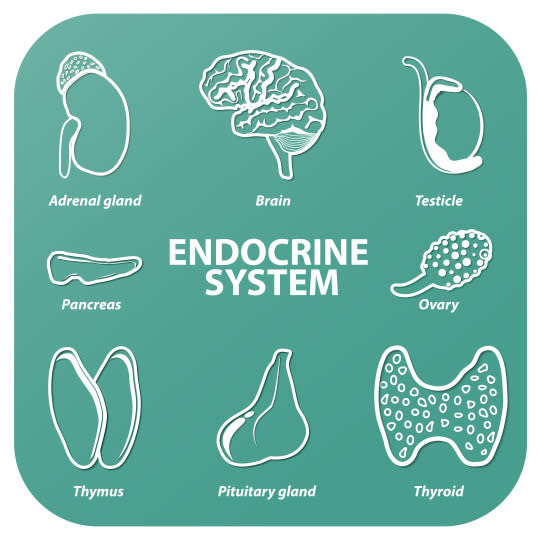10 Ways to Balance Your Hormones for Health, Energy and Weight Control

Re-balancing the endocrine system for optimal health (Photo: iStockphoto)
So often, patients drag themselves into my office complaining of multiple symptoms like thinning hair, brittle nails, erupting skin, poor sleep, exhaustion, constipation, sexual or menstrual dysfunction and weight gain. These are all clues that can suggest hormonal imbalance – several different types.
For example, fatigue and difficulty sleeping suggest problems with the adrenals, the glands that produce stress hormones. Fatigue—along with constipation, thinning hair, brittle nails, and weight gain – suggest problems with the thyroid, the gland that produces thyroid hormone. Peri-menopausal and menstrual issues suggest imbalances with estrogen, progesterone, and testosterone, the sex hormones. Weight gain and fatigue are often a combination of all three of these hormonal imbalances.
But weight gain may also suggest a diet with too many sweets and starches. Carbohydrate-intolerance, meaning the hormone insulin isn’t working properly, is too often the culprit. I find the vast majority of patients I see who are struggling with their weight, especially as they get older, are somewhat insulin “resistant” and are eating too many carbs for what their bodies can efficiently metabolize.
In short, generally feeling and looking like crap is not OK, nor is it simply a normal side-effect of aging. However, it does indicate that your hormones may be out of balance and in need of some TLC, or even a total reboot. Even if your doctor has tested your adrenals, thyroid, and blood sugar and found “nothing wrong” by conventional measures, chances are good that the balance of your hormones are anything-but-optimal. Instead of just living with it and accepting what some docs consider to be the inevitable by-product of aging, here are 10 ways to balance your hormones, fight back and feel better. When you focus on fixing the underlying dysfunctions, your hormones will find that nice, healthy balance, no matter what your age. So here’s where to start:
Cut back, way back on the sweets and starches… too many can set your hormones on a wild ride. Or better, eliminate sweets and starches altogether for two weeks to see how your body reacts.
Try reducing your grains, legumes and high sugar fruits for two weeks…as you unknowingly may be carbohydrate-intolerant. Over-doing it on these carbs can cause metabolic problems for those of us who are insulin resistant or who don’t process carbohydrates efficiently.
Eat more healthy fats – and let go of fat-phobia. Too few good fats on your plate will short-change your body’s ability to produce the hormones that boost energy, feelings of satiety and suppress cravings.
Be good to your microbiome… as in, feed your gut with plenty of immunity-supporting fermented foods and belly-benefiting fiber to support good bacteria and keep bad bacteria in check. This will not only keep digestion and elimination running smoothly, but help hormone function too.
Avoid reactive, inflammatory foods… like sugar, gluten, processed foods and junk food, as they over-tax your immune system, gut and endocrine system.
Aim to sleep more and better. Not enough sleep or poor quality sleep wreaks havoc on your system, limiting your body’s ability to release the hormones necessary to repair, restore and refresh cells as you snooze. The result? A more rapidly aging body and brain. (No thanks!) Shoot for 7 – 8 hours nightly to enable your hormones to do their job.
Cool it on the stimulants. Too much caffeine in the form of coffee, energy drinks, sodas, and sometimes even tea or chocolate interfere with the hormones that promote restorative sleep.
Cut the chemicals. There’s no hormonal upside to on-going low-level exposure to common chemicals in your food, air, water, household cleaners, personal-care products and cosmetics – in fact, they interfere with optimal hormonal function. Make an effort to switch to the least toxic, most natural products possible to limit exposure to chemicals.
Minimize the meds. On-going exposure to meds, including both over-the-counter remedies and prescription drugs can stress our microbiomes and throw hormones out of whack. Avoid hormone-disrupting OTC meds and, if you must take prescription drugs, ask the doc to prescribe the smallest therapeutic dose possible.
Train yourself to unwind… in ways that enhance healthy hormone function. Whether you’re dealing with unremitting life challenges or bouts of intermittent stress, remember to blow off steam regularly: find a funny movie and laugh uproariously, put on some music and “dance it out,” or treat yourself to a night out and have some well-deserved fun! Add to that a regular meditation and a simple, restorative yoga practice and you’ll be well on your way to balancing your hormones, in addition to staying more relaxed, fit and trim.
To get started on learning the basics of stress-busting, restorative yoga, take a look at my illustrated guide and let the hormone re-balancing begin!
By Dr. Frank Lipman
More from Dr. Frank Lipman:
15 Ways to Reduce Endocrine Disruptors in Your Kitchen
Soy Is Not a Health Food: 6 Things to Know About Soy’s Big Downside
10 Hidden Sources of Endocrine Disruptors and How to Avoid Them
